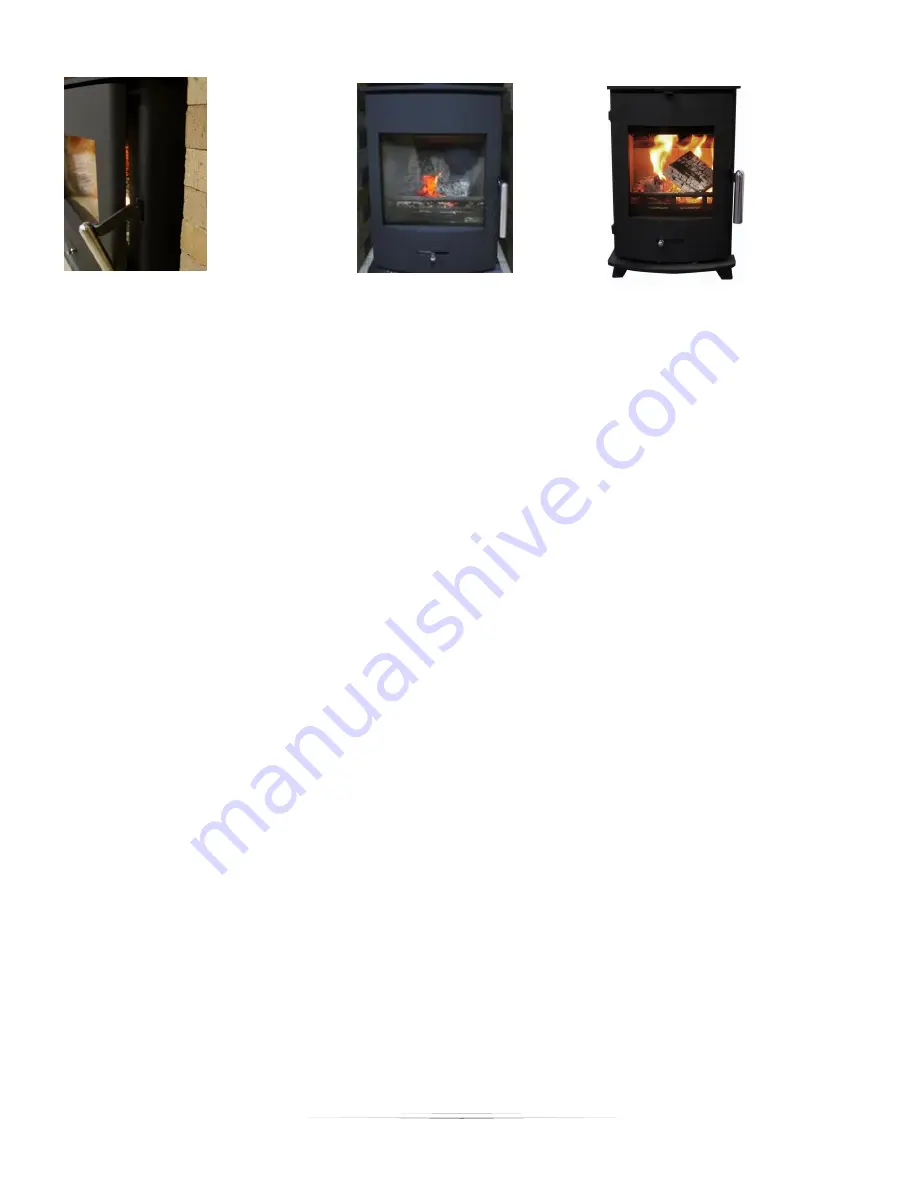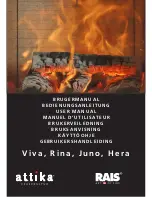
5
Installation and Operating Instructions for Newbourne 35/40/50/60FS Multi Fuel Stoves
Ref: Pevex1022/AH/ver1:May2015
Note
: If the fire dies down completely or embers are smoldering then it will be necessary to place some
screwed up paper or firelighters onto the grate with some kindling or small pieces of wood to reestablish the
fire once again. Leave the air sliders fully open and allow the fire to build before refueling with larger pieces of
wood and then adjust the sliders for optimum combustion.
Do not overload the firebox by loading above the tertiary air diffuser at the back of the firebox and
ensure that the wood is retained by the log guard. Always ensure that the wood is not tightly stacked
so that air can circulate freely.
Do not leave the door open: Operation with the door open can cause excess smoke. The appliance
must not be operated with the appliance door left open except as directed in the instructions.
Do not leave the airsliders completely open: Operation with the airsliders permanently open can cause
excess smoke. The appliance must not be operated with air controls or dampers left open except as
directed in the instructions.
SAFETY PRECAUTIONS
A risk of blowback can arise if too much dry wood is placed in the stove and burnt with insufficient combustion
air. This may result in the production of gaseous compounds which can ignite if the intake of primary and
secondary air is insufficient and the firebox temperature too low.
To achieve optimal firing and the best possible heat output, the primary and secondary air intakes must be
correctly adjusted. As a general rule, the fire should be regulated using the top secondary air supply, with
which smoke and gases are ignited. This produces a high level of efficiency and also keeps the viewing
window clean because the secondary air ‘washes over’ the glass.
For woodburning it is an advantage always to leave some ash lying in the bottom of the combustion chamber.
Take care when emptying the ash pan, as cinders can continue to burn in the ash for long periods of time.
NOTE
: It is always advisable to leave the top air control open to allow the stove to operate to optimum
combustion.
MAINTENANCE OF MATT BLACK PAINT FINISH
The surface of the stove has been treated with heat-resistant paint. The stove can be cleaned with a
soft brush after it has cooled down. Any damage to the surface in the form of chips or scratches can
be repaired using touch-up paint, which is available in spray cans. If the stove has become grey in
colour due to overheating, touch-up paint of this kind can be used to repaint the stove entirely.
Alternatively the stove can be maintained with a traditional type of stove polish of which there are
several proprietary makes available
.
Do not use an aerosol spray anywhere near the stove when it is either
alight or still hot
– allow it to cool down before respraying.
MAINTENANCE OF THE STOVE GLASS
Incorrect firing, for example using wet wood, or slow burning can result in the viewing window becoming
covered in soot. This soot can be easily and effectively removed by using a damp cloth, proprietary stove
glass cleaner or ash on a soft cloth, when the glass is cold. Burning contaminated, incorrect or fuels high in
Sulphur/pet coke may cause permanent damage to the glass (as described on page 3) which is not covered by
any warranty.
6. Place 2/3 logs on
the ash bed ensuring
that the wood is not
stacked too closely
and with the air
sliders fully open.
The wood will ignite
in
2/3
minutes.
Gradually shut the
primary
air
and
adjust the secondary
air
for
optimum
combustion.
5. After about
40/50 minutes
and when the
last flames go
out a red hot
ember
bed
will be left
and
further
wood can be
added.
4. With the door slightly
open
the
fire
will
quickly build warming
the stove and chimney.
After about 5/10 minutes
the door can be shut and
the
stove
can
be
controlled by the air
sliders. Shut the primary
air slider and control the
burning rate with the
secondary air to give
optimal combustion.




























